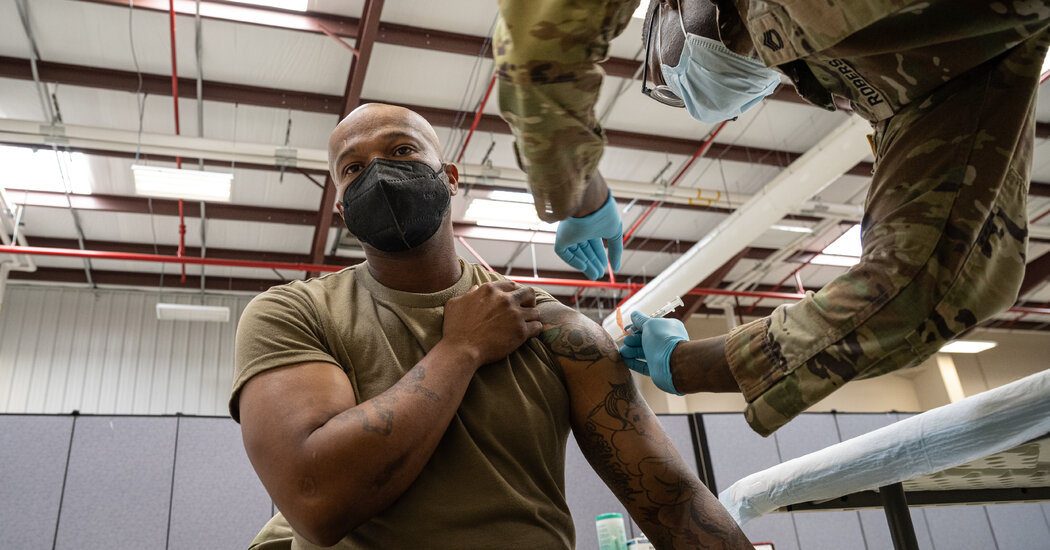At the Department of Veterans Affairs, where thousands of workers who interact with patients were supposed to be fully vaccinated by Oct. 8, offici
At the Department of Veterans Affairs, where thousands of workers who interact with patients were supposed to be fully vaccinated by Oct. 8, officials have taken a dim view of such exemptions. Since the department issued a vaccine mandate for its 115,000 frontline health care workers this past summer, about 88 percent of the 380,000 employees covered by the mandate have had at least one dose, falling short of officials’ hopes for nearly full vaccination.
In hospitals or nursing homes with particularly vulnerable populations, “I think that there will be a point there where it is an undue burden on us to ensure safety in the provision of health care,” said Denis McDonough, the secretary of the department, “at which point we’re going to have to deny religious exceptions.”
Vaccine reluctance in the military and the Department of Veterans Affairs mirrors that of civilian society, where vaccine rates are largely lower without such mandates. Some people have embraced vaccine conspiracy theories or have been fearful of possible side effects, or do not see themselves at risk for the virus.
What to Know About Covid-19 Booster Shots
The F.D.A. has authorized booster shots for millions of recipients of the Pfizer-BioNTech, Moderna and Johnson & Johnson vaccines. Pfizer and Moderna recipients who are eligible for a booster include people 65 and older, and younger adults at high risk of severe Covid-19 because of medical conditions or where they work. Eligible Pfizer and Moderna recipients can get a booster at least six months after their second dose. All Johnson & Johnson recipients will be eligible for a second shot at least two months after the first.
Yes. The F.D.A. has updated its authorizations to allow medical providers to boost people with a different vaccine than the one they initially received, a strategy known as “mix and match.” Whether you received Moderna, Johnson & Johnson or Pfizer-BioNTech, you may receive a booster of any other vaccine. Regulators have not recommended any one vaccine over another as a booster. They have also remained silent on whether it is preferable to stick with the same vaccine when possible.
The C.D.C. has said the conditions that qualify a person for a booster shot include: hypertension and heart disease; diabetes or obesity; cancer or blood disorders; weakened immune system; chronic lung, kidney or liver disease; dementia and certain disabilities. Pregnant women and current and former smokers are also eligible.
The F.D.A. authorized boosters for workers whose jobs put them at high risk of exposure to potentially infectious people. The C.D.C. says that group includes: emergency medical workers; education workers; food and agriculture workers; manufacturing workers; corrections workers; U.S. Postal Service workers; public transit workers; grocery store workers.
Yes. The C.D.C. says the Covid vaccine may be administered without regard to the timing of other vaccines, and many pharmacy sites are allowing people to schedule a flu shot at the same time as a booster dose.
Over the summer, as the Delta variant surged, military officials became alarmed at the growing number of deaths; more active duty members died from the virus in the fall than in all of 2020, and none of them were vaccinated. In total, 71 service members have died. The Navy has led the charge with vaccinations, and roughly 99 percent in the service have had at least one shot ahead of the deadline to be fully vaccinated by the end of the month. Sailors were made acutely aware of the dangers of the virus early in the pandemic when an outbreak occurred on an aircraft carrier deployed to the Pacific Ocean. The captain, who pleaded with the Pentagon for help, was later fired.
There is a “common understanding that we often work in congregate settings such as shipboard environments and it is understood that in these settings, infectious diseases can spread very rapidly,” said Capt. Robert Hawkins, who leads the Navy Medicine’s Commander’s Action Group. “Immunizations have played a large role in readiness to conduct our mission for a long time, so we have had an understanding of their role in protecting our health and mission.”
In the Marines and the Army, about 93 percent of all active-duty troops have been at least partially vaccinated. Each service branch set its own deadlines and complex disciplinary procedures for those who decline shots, including extensive counseling sessions with clergy and commanders.
www.nytimes.com
